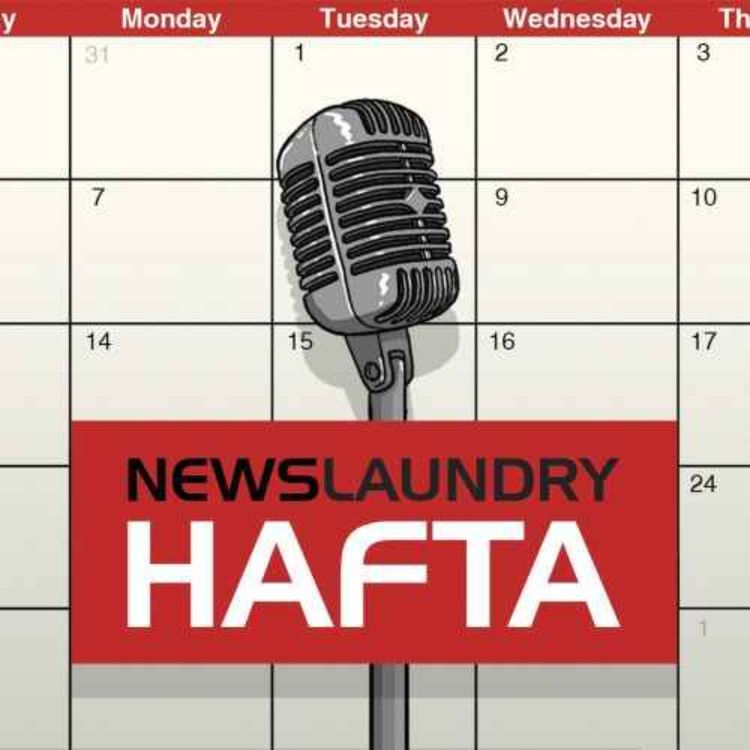Share

NL Hafta
Hafta 480: Indian think tanks, Congress’s inevitability, ‘Ram’ in election campaigns
This week, Newslaundry’s Abhinandan Sekhri, Manisha Pande, and Jayashree Arunachalam are joined by policy researcher Yamini Aiyar and senior journalist Rasheed Kidwai.
On the challenges facing think tanks in India, Yamini says working in policy has “moved from jholawala inputs to suit-boot inputs” over the years, referring to the increased corporatisation.
The panel then discusses the Congress manifesto, and the party’s relevance in the upcoming elections. Abhinandan asks, “Is the Congress inevitable?” Rasheed says the grand old party is “not a dead body. It is very much alive and kicking.”
The conversation then moves on to the controversy around Ramayana fame actor Arun Govil campaigning in Meerut with a photograph of the deity Ram. On the use of religion for votes, Rasheed says it’s “not an issue” for voters in India.
This and a whole lot more. Tune in!
We have a page for subscribers to send letters to our shows. If you want to write to Hafta, click here.
Check out the Newslaundry store and flaunt your love for independent media.
Download the Newslaundry app.
General elections are around the corner, and Newslaundry and The News Minute have ambitious plans. Click here to support us.
Timecodes
00:07:09 - Policy research in India
00: 17:41 - Headlines
00:27:09 - Think tanks in India
00:38:13 - Is the Congress inevitable?
00:59:50 - Use of religion in election campaign
01:22:31 - Letters
01:55:19 - Recommendations
Hafta letters, recommendations, songs and references
Check out our previous Hafta recommendations.
Produced and recorded by Priyali Dhingra, edited by Samarendra K Dash and Umrav Singh.
—------------
More episodes
View all episodes

Chota Hafta 577
17:02|This week on Hafta, Newslaundry’s Abhinandan Sekhri, Manisha Pande and Shardool Katyayan are joined by Amba Kak, a tech policy expert and researcher, and Alex Travelli, the South Asia business correspondent for The New York Times.Check out previous Hafta recommendations, references, songs and subscriber letters.Produced by Ashish Anand & Amit Pandey. Sound by Anil Kumar
Chota Hafta 576
20:58|This week on Hafta, Newslaundry’s Abhinandan Sekhri, Manisha Pande, Jayashree Arunachalam, Raman Kirpal and Anand Vardhan are joined by filmmaker Sudhir Mishra and senior journalist Arati Jerath.Check out previous Hafta recommendations, references, songs and subscriber letters.Produced by Amit PandeyAssistant production by AshishSound design by Anil Kumar
Hafta 575: The Naravane book row, WaPo layoffs, and TM Krishna on ‘making democracy a culture’
02:14:55|This week on Hafta, Newslaundry’s Abhinandan Sekhri, Manisha Pande, and Jayashree Arunachalam are joined by musician and author T.M. Krishna and defence analyst Ajai Shukla for a conversation that spans Parliament flashpoints, billionaire ownership in journalism, and the deeper cultural fight over India’s national symbols.The panel opens with a discussion around the furore in Parliament over former Army chief General M.M. Naravane’s yet-to-be-released memoir this week. Questioning Om Birla’s claim that the Opposition was planning an attack on PM Narendra Modi, Manisha says, “It’s fear-mongering… the same story as what prime time had done back when the Prime Minister got stuck in a traffic jam.”Ajai Shukla opines that the very fact that a former Army Chief’s account is stuck in clearance limbo shows how tightly the government controls uncomfortable narratives around national security and China.The discussion then transitions to the layoff purge at The Washington Post, which Jayashree describes as a symptom of a world where media outlets are “bought by a billionaire” and then “gutted to maximise profits”. Abhinandan argues that economics is not just a study of money, but a study of societies, adding that journalism is a public good that cannot be left to the mercy of a billionaire.Finally, TM Krishna discusses his new book, We, the People of India, which examines India’s anthem, flag, and other national symbols. Krishna contrasts Vande Mataram with Jana Gana Mana, arguing they reflect very different ideas of India. He also points to a deeper democratic failure. “We entirely failed in making democracy a culture,” Krishna says, arguing that constitutional values were reduced to textbook lines you “just mugged up to write in an examination.”This and a lot more. Tune in!Timecodes00:00:00 - Introductions and birthday announcements!00:05:25 - Headlines00:28:14 - T.M. Krishna on his book and being an artist today01:28:00 - Controversy over General MM Naravane’s book01:49:11 - Letters02:08:10 - RecommendationsIf you want to write to Hafta, click here. Click here to contribute to our Sena project. Check out the Newslaundry store and flaunt your love for independent media. Download the Newslaundry app. Check out Hafta recommendations, references, songs and letters.Produced by Priyali Dhingra, with assistant production by Ashish Anand. Sound by Anil Kumar
Chota Hafta 574
18:30|This week on Hafta, Newslaundry’s Manisha Pande, Jayashree Arunachalam, and Anand Vardhan are joined by journalist Nikhil Inamdar and Sudipto Mondal, executive editor of The News Minute.Check out previous Hafta recommendations, references, songs and letters.Produced by Amit Pandey, with assistant production by Ashish ,Sound by Anil Kumar
Hafta 573: Funding the Davos circus while the net tightens on press freedom in Kashmir
01:34:41|This week on Hafta, Newslaundry’s Abhinandan Sekhri, Manisha Pande and Jayashree Arunachalam are joined by journalist and entrepreneur Govindraj Ethiraj. The discussion opens up with the recently concluded World Economic Forum held in Davos. Abhinandan sharply questions the performative nature of Indian participation at the forum, criticising chief ministers for announcing Memorandums of Understanding (MoUs) with Indian companies on foreign soil. “We are funding the circus,” Jayashree remarks bluntly, calling Davos a “clown show” driven by optics rather than outcomes.Govindraj also agrees that announcing MoUs, especially with Indian firms, is a misallocation of time and attention, given how the WEF offers leaders “an opportunity to gauge the temperature of what is happening in the world order right now”. The discussion also touches on the much-touted India-EU free trade agreement, which European Commission president Ursula von der Leyen described as the “mother of all deals”. Govindraj, however, tempers expectations, warning that free trade agreements are often narrow and slow-moving. “The first bottle of cheaper Scotch won’t arrive tomorrow – it could take five years,” he quips.He further adds, “The red lines for India are clearly dairy and agricultural products… You can’t do something which immediately jeopardises your farming lobby. So, if you take away agriculture and cheese, what’s left now?”From Davos, the conversation shifts to press freedom in Jammu and Kashmir. Speaking on the recent summonses sent national media reporters by the J&K Police, Manisha remarks, “Over the last one year, at least 25 journalists have been summoned by the J&K Police… anything at all can just land you in a police station being questioned, because it’s ‘public disorder’, you’re causing ‘public safety’ disorder.”Drawing a contrast between reporters in New Delhi and Kashmir, Abhinandan says, “It’s very difficult for someone in J&K to tough it out because there is no insulation. Delhi provides great insulation; that’s why those headquartered in Delhi have to step up and protect their reporters who are not in Delhi.This and a lot more. Tune in!Timecodes00:00:00 - Introductions and announcements00:04:40 - Headlines 00:17:15 - WEF Davos / India- Eu trade deals 00: 55:59 - Govind’ recommendations01:08:51 - Kashmir reporter’s summoning 01:17:35 - Letters01:28:07 - RecommendationsCheck out previous Hafta recommendations, references, songs and letters.Produced by Amit Pandey, with assistant production by Ashish, Sound by Anil Kumar
Chota Hafta 572
15:42|This week on Hafta, Newslaundry’s Abhinandan Sekhri, Manisha Pande, Jayashree Arunachalam and Anand Vardhan are joined by Chander Shekhar Luthra, a veteran sports journalist, and Suhasini Haidar, diplomatic affairs editor of The Hindu. Check out previous Hafta recommendations, references, songs and letters.Produced by Amit Pandey, with assistant production by Saurav Sound by Anil Kumar
Chota Hafta 571
15:55|This week on Hafta, Newslaundry’s Abhinandan Sekhri, Manisha Pande, Jayashree Arunachalam and Raman Kirpal are joined by Ishaan Tharoor, a foreign affairs columnist at The Washington Post and Advocate Vrinda Grover. Check out previous Hafta recommendations, references, songs and letters.Produced by Amit Pandey, with assistant production by Ashish Anand. Sound by Anil Kumar
Chota Hafta 570
15:17|This week on Hafta, Newslaundry’s Abhinandan Sekhri, Manisha Pande, Jayashree Arunachalam and Anand Vardhan are joined by Kallol Bhattacherjee, Senior Assistant Editor at The Hindu.Check out the Newslaundry store and flaunt your love for independent media. Download the Newslaundry app.
Hafta X South Central: Highs & lows of media in 2025, influencers in news, Arnab’s ‘turnaround’
01:42:40|For this special year-ender episode, Newslaundry’s Abhinandan Sekhri and Manisha Pande and The News Minute’s Dhanya Rajendran and Pooja Prasanna are joined by columnist and media critic Santosh Desai. The conversation begins with a wrap of the Indian media ecosystem this year. Santosh says, “Institutions are struggling to retain credibility and resist pressure.” Dhanya argues that mainstream media exerts significant influence over people, but on social media, the results vary. Discussing the state of the media more specifically in Karnataka, Pooja notes that although it's “heavily compromised”, it can still be seen as a “lesser evil” compared to the Hindi and English media.Manisha argues that, in terms of news consumption, the internet can be very ruthless – in contrast to legacy media, which does not have to face the crash and burn. She cites the example of Beer Biceps, whose rapid rise and fall illustrate this ruthlessness. Some influencers, Dhanya says, have also realised that “credibility comes with consistency”. On the economic front, Abhinandan explains, “It is the lethargy of legacy media that is reflected in their belief about how business is done – in large spaces and studios. Hence, sustainability and viewership become two completely different things.”The panel also discusses advertisements that make them nostalgic. Dhanya says, “Now, we pay to remove ads. I cannot remember the last time I watched an ad.” Meanwhile, Abhinandan notes, “The death of ads is the death of jingles, which in turn traces to the death of radio.”While discussing Arnab Goswami's recent shows that questioned the central government, Pooja remarks, “This man can damage the country by stooping so low, but all it takes for him to be viewed as a crusader is the targeting of a soft issue as a larger strategy.”This and a lot more. Tune in!We have a page for subscribers to send letters to our shows. If you want to write to Hafta, click here. And click here to contribute to our new Sena project.Check out the Newslaundry store and flaunt your love for independent media. Download the Newslaundry app. Once a month, we will invite one TNM subscriber to the show. Write to us on what you would like to speak about to southcentral@thenewsminute.com Send your thoughts, suggestions, and criticism as well.You can also let us know what you think by filling out our quick feedback form. Your suggestions help shape future episodes of South Central.Become a subscriber - Click here.Contribute to our reporting fund. Click here. To check out our other shows, Click here To not miss any updates, join TNM's WhatsApp Channel! Click hereTimecodes00:00:00 - Introductions & announcements00:02:16 - Headlines00:07:30 - Brands vs individuals: Understanding news models 00:33:15 - Karnataka Hate Speech Bill00:38:00 - How has advertising changed?00:59:00 - Santosh’s recommendations01:00:00 - Arnab Goswami’s turnaround 01:07:00 - Christmas violence 01:12:00 - Letters01:35:13 - Recommendations Check out previous Hafta recommendations, references, songs and letters.Recorded and produced by Priyali Dhingra. Production assistance by Megha Mukundan and Ajai. Edited by Saif Ali Ekram.